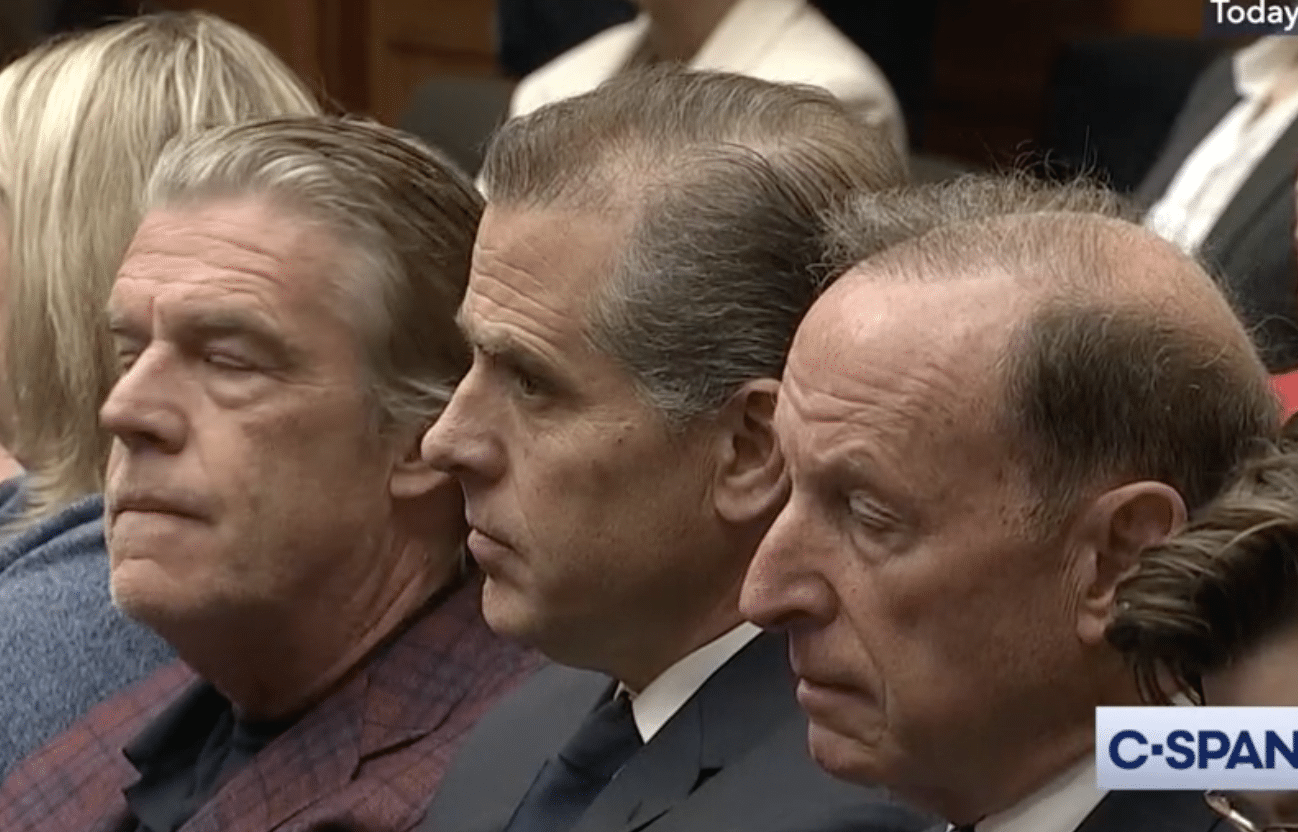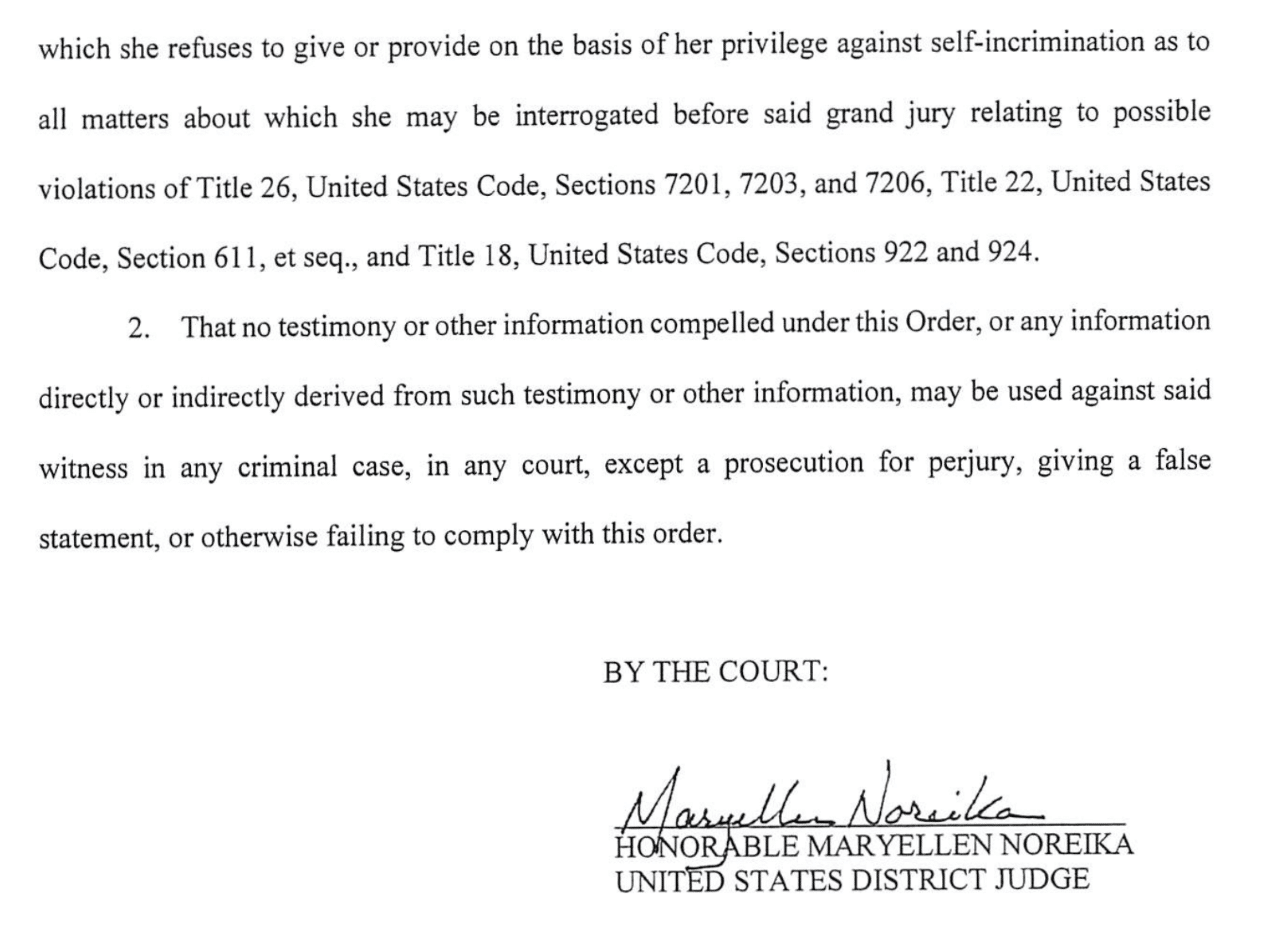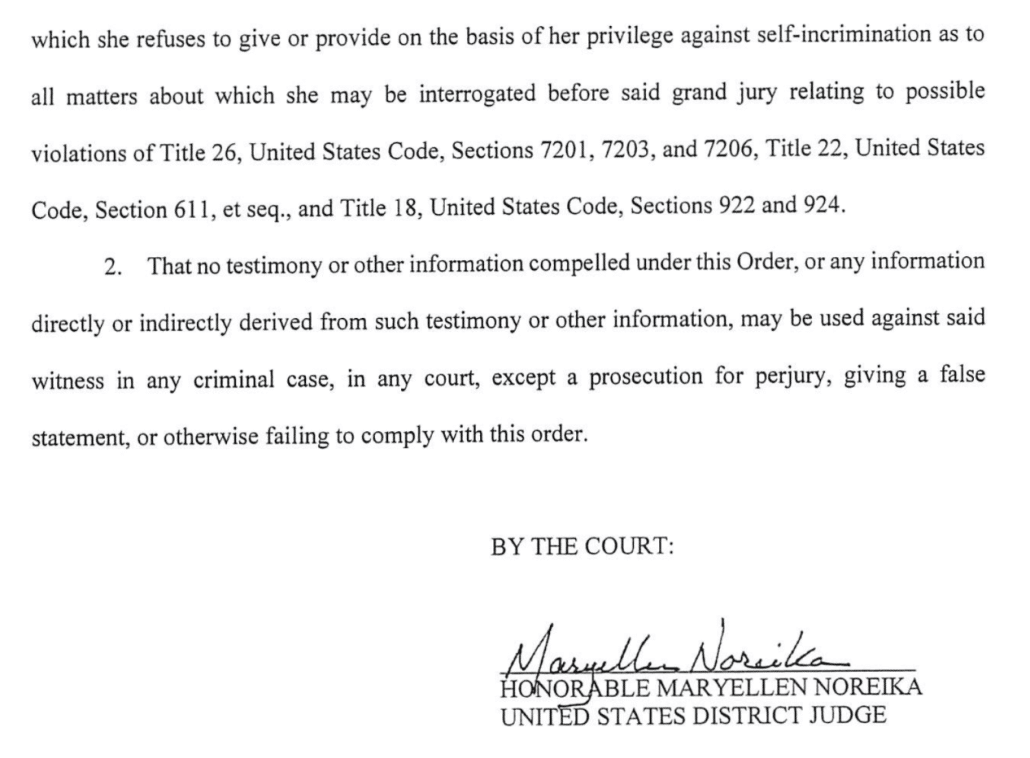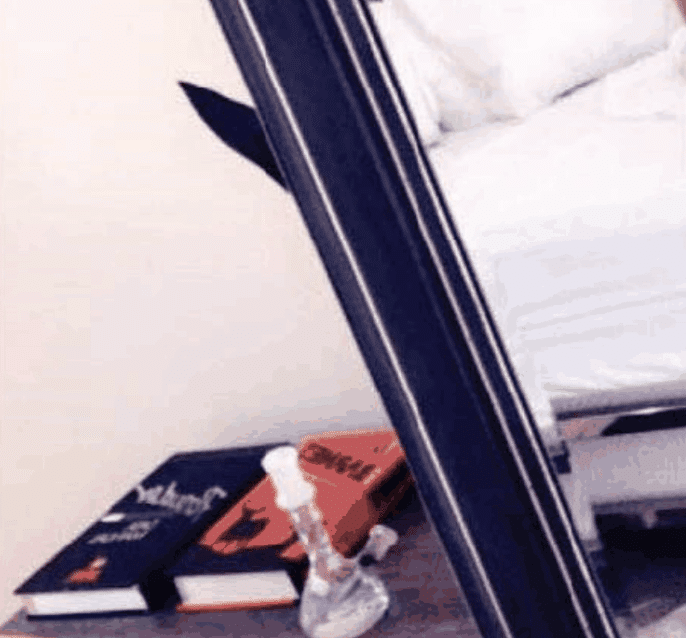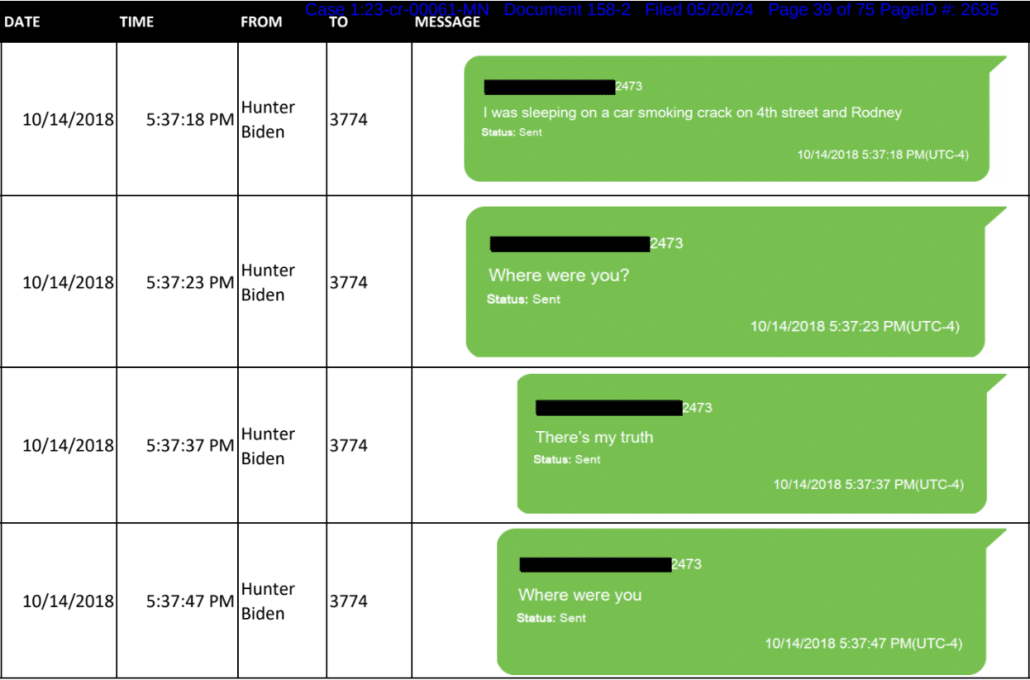What Jurors Noticed about Hallie Biden’s Testimony
As I’ve said over and over, Hallie Biden was the most important prosecution witness against her brother-in-law.
In his close yesterday, Leo Wise described that Hallie’s testimony that she found remnants of crack cocaine in Hunter’s truck days after, according to Naomi Biden, it was clean, is compelling circumstantial evidence that Hunter smoked crack in the truck between those days.
And if you compare what Naomi Biden said that she returned the truck to her father clean on October 19th, 2018, that there were no drug remnants in it and there was no drug paraphernalia in it, to Hallie Biden’s testimony that she searched the truck on October 23rd, just a few days later, that she found drug remnants. Remember, the way she testified what a drug remnant is, is when you break pieces, smaller pieces of crack off a larger rock, a lot of it falls and breaks off, that’s what a remnant is, and that’s what Hallie Biden saw in that truck on October the 23rd, and she also found drug paraphernalia.
So what does that mean? What does a clean truck with no drug remnants and no drug paraphernalia on October 19th, as in the testimony of the defendant’s own daughter, and then a truck with drug remnants and drug paraphernalia on the October the 23rd, what does that mean?
Abbe Lowell attempted to pitch her testimony as more inconsistent than that, describing how key parts of her testimony might confuse what happened on October 23, 2018, when she found the gun, and earlier times when she had searched his truck, noting that her testimony that Hunter had spent that night with her was inconsistent with him calling her and then taking an Uber back to her house.
But even she said she did not see Hunter using drugs in this period. And said only that when she went into the truck on October 23rd, first she said there were remnants and paraphernalia, but then when asked said a dusting of powder, I guess. And when I asked her to be more specific and tell us whether those remnants were on the console, steering wheel, floor mats, or car seat, all do you remember she said is, I do not recall.
And when asked what type of paraphernalia, she again said, I do not recall.
Was she remembering what she saw that day or dozens of other days when she, too, was using, where that more likely than not happened, okay. But if you noticed, she could remember that which the prosecutors asked her, the prosecutors who also gave her immunity, but not so much for any number of things. When she saw Hunter when he came back from LA, even if it was on the day he came back to go with her at an appointment she had at a Caron rehabilitation center or facility, when she saw him — or when she saw him, whether it was October 22nd or 23rd, whether it was the night, whether it was the night before, whether it was the early morning or when. And you’ll remember that I asked her whether or not when I could refresh her recollection, did she know that she was not with him that morning. And do you remember when I had to do that by saying do you remember the reference to calling an Uber? And then she said yes. You don’t need an Uber to go from her driveway into the house.
Before he launched that section of his closing arguments, however, he evinced sympathy that Hallie was put into this situation in the first place.
Where else did they go? Poor Hallie Biden, who had to be dragged through this period of her life again, who understandably did not remember a lot of the details.
Poor Hallie Biden didn’t remember a lot of the details…
This is something that we won’t be able to measure, unless and until jurors speak publicly about their deliberations after a verdict. It’s one thing to have sympathy or no for Joe Biden’s son, who was known to have addiction problems in Delaware. It’s another thing to have sympathy for Hallie Biden, the widow of the state’s much better loved former Attorney General.
And that’s why something that happened the day Hallie testified is of interest.
It showed up publicly in this exchange with Leo Wise on redirect, something some journalists covering the trial found odd.
BY MR. WISE: Q. I just have a few questions, Ms. Biden. The first is were you married just this past weekend, recently?
A. Yes.
Q. And is your husband in the audience?
A. Yes.
Q. And at the breaks have you been looking at him and him looking at you?
A. Yes.
Q. Has any of that had anything to do with your — the substance of your testimony?
A. No, just support.
But two sidebars in the middle of Abbe Lowell’s cross-examination of Hallie explain the background to Wise’s comment: A juror had told Judge Noreika’s courtroom deputy that they had seen Hallie communicating with someone in the courtroom and seemed to find it suspicious.
THE COURT: So one of the jurors said to Mark when she was leaving that when we were over here at side-bar, that they noticed that she was communicating with someone in the back. Now, I don’t know if she has a lawyer here.
MR. HINES: She does.
MR. WISE: Well, it’s her husband. She got married this weekend and I can see him in back.
THE COURT: So she was communicating with someone. They were like mouthing something to her. My guess is it was something on the order of, you know —
MR. LOWELL: What a jerk I am.
THE COURT: My guess.
MR. LOWELL: Could you clean that one up. What a jerk I am. Thank you.
MR. HINES: No objection.
THE COURT: Okay. So they noticed — so one juror, it’s the second alternate, so we know we have the two younger women, so it’s one of them. And then she said to him — and you can ask Mark questions, too, she said to him and other jurors noticed, too.
MR. LOWELL: So I’m sorry to get this right, Mark, Mr. Buckson, the first — second alternate says it to you?
COURTROOM DEPUTY: She stays behind and says, “I have to talk to you a minute.”
MR. LOWELL: When she did, she said other jurors saw it, too?
COURTROOM DEPUTY: She told me what happened and said other jurors saw it, too.
This created two concerns: The juror had found the exchange suspicious. And jurors talked about it.
MR. LOWELL: Meaning that they talked about it.
THE COURT: That’s what I said to Mark, that’s why I want to tell you guys everything that they said. Now what I don’t know — my guess is, it was on the way out the door, so it wasn’t like they had talked about it in the jury room. It was probably one of those things where they were like this, you know, but I don’t know that.
MR. LOWELL: I understand
THE COURT: So if you guys want to ask, you can. So what I thought I would do is tell you now, even though I interrupted your lunch, so you can go back, you can figure out who the person was.
MR. WISE: I saw him.
MR. LOWELL: She also has her lawyer.
MR. WISE: I mean, if someone is mouthing like hang in there, doing, whatever it is, I’m guessing it’s the husband, I don’t think a lawyer is mouthing something.
THE COURT: I don’t know who she was doing it with. Maybe you can go figure out. Maybe you can find out what they are saying and you guys can figure out what you want to do if you want to talk to the jury or you want me to talk to the jury.
MR. LOWELL: Or maybe we let it be.
THE COURT: Let it be with a reminder that don’t talk to each other.
So Judge Noreika and the lawyers discuss how to address this — both the jurors discussing among themselves, and the impression of something suspect going on be allayed — without making the problem worse.
MR. WISE: My only concern if she think she’s being coached or something.
THE COURT: If she’s doing something improper.
MR. WISE: I don’t want that impression to be left on them.
MR. LOWELL: Unfortunately, to figure that out, you would have to start inquiring who were you talking to, what were you mouthing, what was he mouthing back, and that concerns me as much as, you know, as anything because why — how is that helpful, right.
Let’s figure out before we bring them back what is the least that is necessary, if anything, because if you start inquiring, how is that helpful, right, I don’t think that’s helpful. I understand you don’t want the jury to think she’s being coached, certainly not by my party.
MR. WISE: Right.
MR. LOWELL: But I wonder how do you do that with finesse. Nothing comes to my mind at the moment, but I’ll try to put my mind to it. Thank you for telling us. And right now I don’t have anything I would suggest, but I’ll talk to you all about it.
THE COURT: Maybe you guys, somebody can just check with her lawyer and husband and find out what that was.
MR. LOWELL: Thanks, Your Honor, for bringing it to our attention. (End of side-bar.)
COURTROOM DEPUTY: All rise.
THE COURT: All right. So can I just see counsel for one second. (Side-bar discussion.)
THE COURT: So you want me to do what?
The agree that Judge Noreika will admonish the jurors not to talk to each other about the case. But that still left the problem of what to do with the appearance that someone might be coaching Hallie.
MR. LOWELL: I thought the, we talked, I think what we agreed was you don’t have to do it right away or whenever you would, it would just be the normal instructions to the jury just a reminder that you shouldn’t be talking to each other about the case, among yourselves of anything that’s happening, you have that, I don’t know exactly the words.
THE COURT: And then with respect to the discussions, are you okay if they just want to ask her, do you have someone here supporting you or something so the jury understands?
MR. LOWELL: I would object to that as somebody here supporting you.
THE COURT: Someone here —
MR. LOWELL: I mean, if you want to say do you have a relative — I mean, I don’t know. My view is do the least. But if you feel like something needs to be said. But I don’t know how that doesn’t make it worse.
MR. WISE: Was your impression that they thought it was something wrong going on?
COURTROOM DEPUTY: Kind of.
MR. WISE: Okay.
COURTROOM DEPUTY: It was a suspicious.
MR. LOWELL: Let’s say she has a relative, the problem, it still opens the door, what was your relative saying to you, were they just giving you a high five.
MR. WISE: The question would be Ms. Biden were you recently married, yes, just this week, is your husband here in audience to support you, yes.
MR. LOWELL: Not support you.
MR. WISE: Yeah, that’s what spouses do.
THE COURT: Is your husband here with you.
Leo Wise proposes to ask whether the person Hallie has been exchanging words of support with said anything about her testimony. I think that Lowell objected to this, though not vociferously.
MR. WISE: At the breaks, have you been looking at him and exchanging supportive words, has anyone been telling you what to testify about.
MR. LOWELL: I object to all those questions.
THE COURT: Well, I don’t object to has anyone told you what to testify.
MR. LOWELL: I mean in general, yeah.
MR. WISE: I don’t know what the prejudice is for her to say my husband is in the audience, I have been looking at him and he’s been looking at me for support.
MR. LOWELL: For support, how about I have been looking at him and he’s been looking at me.
THE COURT: And anything in that, was he telling you what to say, or something like that?
MR. WISE: Okay.
THE COURT: People are telling you what your testimony should be, something like that.
MR. WISE: Yeah.
THE COURT: Because I — look, I’m just concerned that the jury, there was nothing — I don’t think there is anything that she did wrong.
Over lunch, prosecutors confirmed that Hallie was exchanging comments with her spouse, whom she married the weekend before the trial.
MR. WISE: We confirmed with the lawyer, we said is she talking to you, no, no, the husband is here. He’s not going to obviously tell her anything about her testimony, but I am concerned that we’re leaving an impression with the jury that she’s doing something wrong, so if you just want to say, were you recently married, is your husband here with you, and then have you during breaks looked to him, and did anything that you do — any of your interactions about your testimony or something like that.
MR. WISE: Okay.
MR. LOWELL: Say that, were any of your interactions, sorry, were any of your interactions about your testimony.
THE COURT: Yes.
MR. LOWELL: Is that the phrase?
THE COURT: Yes. I was just trying to get at that it’s not influencing her testimony, but if there is a better word for that.
MR. WISE: I think maybe while you are on the stand.
THE COURT: Yes. While you were on the stand did you occasionally look to him, was any of that about your testimony?
MR. LOWELL: I mean —
THE COURT: I know, and you can object and if you have to object now.
Lowell again objects to any comment specifically about her spouse.
MR. LOWELL: Why don’t, we could that now, let me do it now. Yeah, I just think the more we inquire, the worse it gets, so I object to anything other than the instruction to the jury, telling them that you’re not supposed to be talking about the case before you deliberate.
THE COURT: I understand. The problem is that horse is out of the barn and I can instruct them on that going forward, but for this particular horse and barn, I don’t want the jury left with the impression that something nefarious was going on. I have enough issues with her testimony let alone something wrong.
MR. LOWELL: Let’s put this horse back in the barn, but can we do it with the fewest number of kicks to the side, to use the analogy.
THE COURT: Yes. I think that’s what it is, if you think there is a way that we can kick less, I took out support.
MR. LOWELL: Right.
THE COURT: I took out support and all I wanted to clarify is it didn’t have anything to do with — he doesn’t know anything about her testimony.
MR. LOWELL: But we don’t have to explain that.
THE COURT: Exactly.
MR. LOWELL: Okay. (End of side-bar. )
THE COURT: All right. We can bring in the jury.
Maybe Wise’s comment alleviated any concerns the jurors had about Hallie’s testimony. And who’s to say whether jurors thought someone coaching her would be on behalf of prosecutors or the defense?
But it’s the kind of thing that could significantly impact the impression jurors got of the testimony from the most important witness at trial.

